Anna Mills
You could probably describe Anna Mills as a been there, done that, sold this, tried that, rehabbed this and even found time to help write some books along the way.
You could also say she’s fought the law (government) and as you might expect, she won. She’s twice been president of National REIA, Ohio REIA and she’s the current president of Toledo REIA. In addition, she’s a Realtor and holds no fewer than 15 professional real estate and contactors licenses, including the skill trades of plumbing, heating, electrical contractor, lead paint supervisor and contractor and clearance tech inspector for lead abatement.

And, if that weren’t enough, she’s a Toastmaster and she speaks and teaches at investor workshops for her local housing authority, at REIAs across the country, and area banks.
Continued on Page 12
2.
3. NREIA Legislative Update
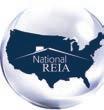
5. Is Your Business Built on One-Night Stands?

6. Most-Expensive (and Least-Expensive) States for IRA Real Estate Investors
8. Streamlining Property Management: From Landlord to Accountant

9. NREIA’s Excellence in Innovation Award Winners
14. Who’s Afraid of Fraud? We All Should Be
15. A System and Discipline

16. Things You Need to Know About Trusts
18. Self-Directed IRAs and 1031 Exchanges: Powerful Tools in a Real Estate Investor’s Arsenal
Being Your Own Bank in Real Estate Investing
By Jason K. Powers
The world of real estate investing, where capital flow dictates growth and success, often puts investors at the mercy of banks, hard money lenders, and private money lenders. These financing avenues, although reliable, come with their unique set of drawbacks. Enter R. Nelson Nash’s concept of “Becoming Your Own Banker,” a revolutionary paradigm detailing the “Infinite Banking Concept.” For real estate investors, it’s essential to analyze how this strategy might be more advantageous than traditional financing channels.
Traditional financing vs. ‘Infinite Banking’
Most real estate investors are familiar with the process: Find a profitable
Continued on Page 10
Common Questions About Assistance Animals
By Victoria Cowart, CPM, NAAEI Faculty
Assistance animals are a big part of life in the multifamily industry these days. Whether an emotional support or service animal, they provide so many renters with the help they need and the quality of life they deserve.

While apartment communities stand ready and willing to do all they can to provide welcoming environments for residents and their assistance animals, there’s no getting around the fact that these animals can present some challenges.
To start with, the volume and complexity of reasonable accommodation requests for assistance animals can quickly overwhelm property management teams. Meanwhile, operators also have to be on the lookout for fraudulent accommodation requests while also navigating the various Fair Housing risks posed by assistance animals.
Continued on Page 14
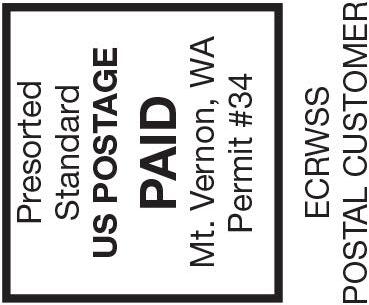
Rental Housing Journal, LLC 4500 S. Lakeshore Drive, Suite 300 Tempe, Arizona 85282 Circulated To Over 40,000 Real Estate Investors Nationwide Vol. 8 Issue 4 REAL ESTATE JOURNA L FALL 2023 $4.95 Published In Conjunction With nationalreia.org rentalhousingjournal.com
Innovation is Necessary for Continued Growth and Success
RE Journal Member Spotlight
Innovation is Necessary for Continued Growth and Success
 By Rebecca McLean, Executive Director, National REIA
By Rebecca McLean, Executive Director, National REIA
Lately, innovation has become a buzzword. But it can be argued that innovation is more important to housing than any other industry, because it is the vital process for creating homes, redeveloping homes and neighborhoods, and maintaining rental homes for both families and individuals. Housing is vital to our population and to America as a whole.
As housing providers, we contribute to many market segments — first to our residents, buyers, etc., but also to those who provide financing, our vendors and service providers, our communities, our industry and sometimes more. Today, the 21st century customer (whether that is a rental resident, a buyer of your rehab, a wholesale customer, or other) operates at lightning speed and expects immediate gratification, and we are more and more expected to deliver housing at the same speed and using innovative processes just like they find in the rest of their lives. Innovation in our industry could mean finding a better way for real estate investors to find properties, buy properties, find financing, screen residents, respond to incorrect resident problems and more — faster and more efficiently.
But what exactly is innovation? Innovation can be defined as something that is a) meaningful to the customer, the company and you and b) unique, new, or different. If a product is not meaningfully unique, its primary feature becomes its low price, which will eventually be beaten by another competitor. When you compete on price, the eventual outcome is death; when you compete on meaningful uniqueness, the returns are limitless. It’s that simple.
How do we innovate?
Innovative ideas require three things:
1. Stimulus or a commitment and time to innovate
2. An open mind, and

3. Removal of fear
The misconception about innovation is one day an owner of a company has a “eureka!” moment in the shower. The result is a groundbreaking silver-bullet idea — executed flawlessly — that propels the company into the future. Rarely does this actually happen. Innovation is challenging. It requires time and resources. Often it requires extensive process improvement and eliminating non-value-added practices from day-today activities.While the business world is clamoring for more and quicker innovation, the reality is that being innovative is a mindset. But driving innovation is a process that means both structure and openness.
Innovation must be a proactive endeavor. There should be a system for innovation, helping your operation to stay competitive, as well as delivering ideas to keep you moving forward. Maybe it’s a tweak to your current strategy, adding a new strategy, finding new service providers, creating shortcuts using technology, or just improving your system for doing what you do. Innovation mindsets and a commitment to including it in your business planning transforms innovation from a random event into a reliable scientific system for profitable growth. You need measurements. I love the imperative “Measure what matters” — and innovation matters. Take stock of where you can implement innovation and then measure as you implement — change and improve, adjust again, and keep improving.
Why does innovation matter?
At any time, a company is either growing or dying.
Innovation is necessary for continued growth and success. Competition is fierce. Clients and consumers in every industry are continually demanding higher quality at reduced cost. Our industry has been exceptionally fortunate. Home prices have continued to rise, rentals rates continue to increase, but these days will not last forever. To continue to find and retain the best residents and to continue to sell at the highest premiums, we need to innovate now while it’s easy and can get us ahead of our competition — before the markets shift and it becomes much more painful and difficult. Without innovation, without introducing meaningfully unique products and services, we will lose our competitive edge.
I can hear you saying, “But I just rehab houses or rent homes, I don’t have a product or service.” Oh, but you do! Your rehabbed home or your rental home is your product and your delivery of that home — either selling or renting it — is your service. Each step involved, from acquiring the property, to the rehab process, to the listing for sale or rent, to the delivery, is something that can be a candidate for innovation. Many — if not all — of the steps in that process can be evaluated for innovation. Technology is sweeping our industry. Don’t discount the effect it can have on your investing business.
Different situations, different approaches
When it comes to owning or managing a business, there’s no “one-size-fits-all” approach. Each success story has its own set of struggles and triumphs. National REIA and our local groups introduce you to business leaders across a wide range of strategies and in all parts of the country and tell you their stories in their own words. In this publication, you’ll read about the personal experiences and leadership strategies of your fellow investors in the Member Spotlight section on the front cover. At your local meetings you will hear your local success stories. The challenges they face are as varied as their own resumes. Some are longtime veterans who are navigating a changing industry, while others have just recently found success in the real estate investing industry. We ask them the kinds of questions we think you’d most like to know about their business backgrounds, biggest challenges and best advice. National REIA affiliated REIA groups are a stronghold of knowledge and expertise.
Our mission is to help housing providers find ways to innovate without a ton of research and a big budget. We do this by helping housing leaders find operational efficiencies and remove obstacles to innovate. We have created an entire benefit offering and a connection to vendors — especially technology-based vendors — as a resource for you. We also highlight new strategies, new ideas and new insights in our monthly REIA Now broadcast. Our daily news service Real Estate Investing Today provides updates on the industry to keep you
ahead of the pack. Our new benefit, the tool powered by Homeworthi that allows you to look at the overall business insights into where to invest, will be an invaluable tool as the markets tighten. We believe providing these tools can help you grow and become successful. For us, giving you the tools you need is part of our mission. It makes businesses more able to develop solutions for all of their very important operating challenges and all of their very important opportunities. Now is the time to learn to be lean, be unique and be profitable through innovation.
Celebrating our leaders and members
Our commitment to innovation is one way of ensuring our industry’s continued growth and success. To that end, since 2002 National REIA has celebrated the REIA leaders who have served their members and helped them achieve their dreams, changing the lives of countless others by helping members improve their neighborhoods while building their businesses and giving back to their communities. Their passion, vision and persistence stand as a testament to their dedication. Twenty years ago, we founded our awards program to recognize these dynamic leaders who build an influential community of innovative entrepreneurs in housing. Each June we host an awards ceremony to celebrate the finalists and to honor their vision, tenacity and spirit. Each year National REIA’s Innovation Awards recognize bold ideas and big changes around the real estate investing world. The program honors associations making significant strides in the areas of education, membership, marketing, etc., as well as honoring emerging groups that show the potential for growth through their innovative practices.
Competition for these awards has grown strong, as noted by our judging panel who evaluated the nomination submissions against a set of criteria that included the value of the initiative, or service, what makes it unique, and how it benefits their members and the industry. Honestly, this was one of the most difficult years to determine the winner because of the quality of accomplishments. What a great testament to the innovation in our industry! Their energy and innovation at the association level have turned their members’ dreams into reality. We applaud them all for taking the road less traveled to launch new initiatives, open minds and fuel the success of their members.
We are proud to present the winners of our Innovation Awards on page 9. We care deeply about the industry and believe strongly that new business creation and organic business growth is crucial to maintaining and enhancing the vibrancy of our industry. Our innovation awards highlight REIA groups who are driving this business creation and growth. These awards provide an opportunity for us to learn from REIA’s top leaders as they tell us how they drive innovation. It is inspiring to hear from so many driven and talented people in our industry.
We salute all the REIA groups and their leaders that submitted for the awards. Join us in celebrating their passion, innovation, and unwavering commitment to their association. Thank you for all you are doing to make real estate investing a thriving industry that supports our economy! Congratulations to our winners and finalists!
Real Estate Journal Real Estate Journal · Fall 2023 2
Rebecca McLean is the Executive Director of National Real Estate Investors Association.
Property Tax Valuations and Chicken Little!
Property valuations have been increasing across the country for the better part of six years now, with a noticeable uptick during and right after COVID in 2020-21. Interest rates have stifled the recent growth, with some high-flying cities seeing reductions in values by 20-30% from their peaks. The bubble-cities aside, the value of almost all properties has increased substantially, and without going into all the aspects of why, we have to acknowledge that it truly is a doubleedged sword.
For those holding property long-term, the increase in value might provide an opportunity to draw on equity, but with the current interest rate market and tightening credit options, that may not be a viable option. For those looking to flip a property after riding a bit of appreciation up, the music is slowing, and in many areas has already stopped. While mortgages are often the largest line item in the budget, property taxes are a growing concern. Each state is handling its property taxes a bit differently, and some with none at all(!) with locals taking up the slack! Here we will only address the issue from the proverbial 40,000-foot level, but with a cautionary tale.
As of 2022 the Tax Foundation found that for those in the following three counties the median property taxes are typically below $200 a year:
• Northwest Arctic Borough and the Kusivlak Census Area (Alaska)*
• Avoyelles, East Carroll, and Madison (Louisiana)
• Choctaw (Alabama)
Alternatively, these eight are among the highest median property taxes in the country exceeding $10K a year:
• Bergen, Essex, and Union (New Jersey)
• Nassau, New York, Rockland, and Westchester (New York)
• Falls Church (Virginia)
Everyone else falls somewhere in between! However, writing that check can get more and more painful as values increase and reappraisal by the appropriate governmental body (typically an auditor).
The Tax Foundation says it is also important to note that governments tax real property in a variety of ways: Some impose a millage on the fair market value of the property, while others impose it on a percentage (the assessment ratio) of the market value. While values are often determined by comparable sales, jurisdictions also vary in how they calculate assessed values. While property taxes tend to be imposed at the local level, their basic framework is typically set by state law.
NREIA Legislative Update
However, the real killer is the “inside millage,” which continues to grow.
Inside millage is a property tax that local governments can levy without an additional vote. The maximum allocation of inside millage ranges by community and is often divided between the county, school district, municipalities, and/or the township of each taxing district. Inside millage is typically used for operating expenses. For example, school boards may levy inside millage for current expenses, permanent improvements, repaying debt, and school district libraries; local municipalities will fund core operations and initial infrastructure. Inside millage is unique because it moves in direct correlation with a property’s value. For example, if a property’s value increases or decreases by 6%, the taxes on the inside millage will increase or decrease by 6%.
Outside Millage as described by Ohio attorney Chris Finney:
“About 90% of your tax bill is outside millage, which is a result of tax levies that year after year generate a fixed amount of revenue for the levy recipients (depending on the district, schools are about 55-70% of your tax bill). For example, a specific levy passed by the voters years ago may generate a fixed $40,000,000 in taxes each year (regardless of inflation or valuation increases). That means that for the great majority of your (in this case) Ohio tax bill, as the valuations increase, the rate rolls back, generating the roughly same revenue for the levy recipient overall each and every year.” While there is more detail on this issue in his article (https://finneylawfirm/blog) a critical element to understand is that if your valuation goes up by 30% or even 300% (yes, a local investor had this happen) your tax bill will not necessarily be commensurate with its increase. The inside millage will scale, but the outside millage should climb far less, as other properties are going through the same re-assessment. However, future levies will be based on that new valuation and could substantially increase the overall tax bill.
Challenging the Valuation
In each state there is typically an administrative process to challenge the valuation and a cottage industry of appraisers and attorneys who can assist in the effort, and their charges may be reflective of the savings involved. In other areas, that fee structure is precluded and there are flat rates. Some processes do not require an appraisal — but be careful. Not going in with sufficient evidence for your proposed reevaluation could result in loss — or worse, an increase in valuation. Seek local guidance!
Junk fees
The White House’s Blueprint for Renters’ Rights was expanded in July in an effort to propose a ban on all fees that are not explicitly related to rent. While transparency is important to protecting renters’ rights in the rental market, the effort to roll out a blanket ban on fees is a shortsighted approach that fails to consider the complexities of property management. Housing providers often incur various expenses related to tenant applications, background checks, maintenance, and property inspections. These fees help cover the administrative costs associated with ensuring the safety and quality of rental properties, specific to the person causing the need for the fee. Banning such fees would ultimately shift the financial burden onto housing providers, potentially discouraging property owners from investing in the maintenance and improvement of rental properties, which could, in turn, negatively impact the overall quality of housing available to tenants. Other housing providers will seek to apply highest potential cost to everyone, to remain compliant with fair housing rules, thereby increasing the cost of housing in an already challenging housing affordability era. It’s essential to strike a balance between renters’ rights and the financial viability of rental property management — bans are not the answer.
Federal Change in Overtime

Small business owners should be aware of the potential challenges that may arise as a result of the White House’s new guidelines, which make millions more workers eligible for overtime pay. While it’s crucial to ensure fair compensation for employees, the increased eligibility for overtime pay could lead to unintended consequences for small businesses, especially concerning tax obligations. Small business owners need to be vigilant in properly documenting overtime hours and ensuring compliance with IRS regulations to avoid potential trouble with the IRS — especially with a new generation of auditors coming on board and computerized process that flags filings for potential problems. Failure to accurately track and compensate for overtime can result in costly penalties and audits. It is imperative for members to consult with tax professionals and implement efficient payroll
Continued on Page 6
Real Estate Journal · Fall 2023 3 Real Estate Journal
To calculate property tax, you can divide the millage by 1,000 and multiply it by the property’s assessed taxable value. For example, a rate of 255.6 mills means a tax of 25.56 cents.





























































Real Estate Journal · Fall 2023 4
Published quarterly for chapters, associated real estate investor associations, their members and guests.
Editor Brad Beckett brad@nationalreia.org
For inquiries regarding Membership, Legislative, REIA organization information or to become a industry partner, call National REIA toll free at 888-762-7342
Fax: 859-422-4916
Hours of operation: 9:00a.m. to 6:00p.m. Eastern time zone Find us online at: info@nationalreia.org www.NationalREIA.org

RE Journal is published by Rental Housing Journal, LLC, publishers of Rental Housing Journal www.rentalhousingjournal.com
Is Your Business Built on One-Night Stands?
By M. Jane Garvey
It may sound ridiculous, but I see it throughout our industry and even the world in general today: Short-term relationships, one-time engagements, and all of the “what’s in it for me” focus that comes with that. Short-term relationships in business result in more work, no loyalty, higher prices, and much less success.
Think about it. Each and every aspect of your business offers you the opportunity to build a relationship. Are you doing this, or are you doing one transaction and then moving on to the next?
Some of us spend time and money door-knocking or mailing for deals. We always hear that lack of follow-up is the main reason why many have limited success with these approaches.
way to test out some contractors for their skill set and reliability. Do they show up on time and keep the job moving forward? Do they have the necessary tools and skills? Do they communicate well, discuss issues they run into with a collaborative problem-solving attitude, bring in other workers as needed, sign the necessary paperwork, get permits as needed, have a good relationship with others in the community and on the job site? Keep in mind, they are also testing you. Do you treat them right, value their input on decisions, understand that there are occasionally unforeseen issues that crop up on rehabs, and pay them on time as agreed in advance? Do you communicate well?
Publisher John Triplett john@rentalhousingjournal.com
Editor Linda Wienandt linda@rentalhousingjournal.com
Associate Editor Diane Porter Advertising Manager Terry Hokenson terry@rentalhousingjournal.com
The articles in RE Journal written by all authors are presented to you for educational purposes only. The authors and the National Real Estate Investors Association strongly recommend seeking the advice of your own attorney, CPA or other applicable professional before undertaking any of the advice or concepts discussed herein. The statements and representations made in advertising and news articles contained in this publication are those of the advertiser and authors and as such do not necessarily reflect the views or opinions of National REIA or Rental Housing Journal, LLC. The inclusion of advertising in this publications does not, in any way, comport an endorsement of or support for the products or services offered. To request a reprint or reprint rights contact Rental Housing Journal, LLC, 4500 S. Lakeshore Drive, Suite 300, Tempe, AZ 85282. (480) 454-2728 - (480) 720-4385.

© 2023 All rights reserved.
If you make a connection, why not take the time to build a relationship? Ask some questions, listen to answers, and see if you can go beyond the one-time conversation. Beyond the initial contact, every contact allows you to ask the other party whether they know anyone you could help. You can ask permission to stay in touch in case you can help them sometime in the future. Then follow up, with the goal to advance the relationship.
Don’t just mail them the same mail piece or ask the same questions. Use a contact manager and make notes of your conversations so that you know who you are talking to and can ask appropriate questions.
Once you make a deal with someone, do you continue the relationship? To what end?
A relationship approach may yield more deals, referrals, connections to resources they have assembled, propertyspecific knowledge and so much more than you will ever get with the one-anddone approach. Try it; at the very least, you can make a friend.
Let’s suppose you buy a property to rehab and resell. The list is long of people that you should build relationships with.
Let’s start with contractors. Are your relationships with contractors sustainable? Sometimes a rehab is a great

What are the benefits of the great relationship with tradesmen?
I think anyone in the business can relate. What a blessing to be able to call someone who can and will take care of a needed repair on a rental or in your home without rolling the dice with the unknown. Great contractors have connections that they can and will refer, if they value the relationship: Other contractors with different specialties. Buddies that can handle your job if they are otherwise engaged. Referrals of potential deals. Relationships with vendors, city inspectors and others. Who they know is often as important as what they can do.
All along the way, you are using service people that you should get to know: Accountants, attorneys, building supply companies, real estate agents, bankers, lenders, title company employees, buyers and more. Each and every one of them offers you the opportunity to build a relationship that can smooth the process of future transactions and get you referrals you wouldn’t otherwise have.
Residents in your rentals are the next relationship you need to have. Good relationships will result in longer-term tenancy, better care of your property, referrals of property to buy, and additional residents. It will make your life easier in so many ways. To do this you need to establish open and friendly lines of communication. Rather than
discouraging calls by not taking them, charging for them, out-sourcing them, or grumbling about them, use them to deepen the connection. If you operate a property in a way that shows you clearly value your residents, you will stand out from the crowd.
Are you capable of long-term relationships?
Do you have any relationships that work well in your life? Let’s investigate them. What works well? What doesn’t work? Are they balanced? Do you think the other person feels the same about the relationship as you do? If not, what can you do to change that?
In building great relationships, we need to make sure to pay attention to what the other party says, wants, and does. This requires exploring the possibilities via listening, asking, feeling, and observing.
There is a mutuality in every great relationship. Can you provide what the other person needs and still get what you need? Are you loyal? Do you refer them to others? Do you hold up your end of the bargain in a timely fashion? Do you discuss problems rather than letting them fester? Are you capable of being open and fair to others? If you can’t answer all these questions with a resounding yes, then you might need to work on your relationship skills. If you don’t see the other party being capable of these things, then you have no business trying to build a relationship with them. Mutual trust and respect are vital. Great relationships benefit all involved for the long run. They will make your life easier and help your business flourish. A solid foundation for your business is built on long-term relationships, not the one-night stands.
Real Estate Journal · Fall 2023 5 Real Estate Journal
M. Jane Garvey is President of the Chicago Creative Investors Association.
Most-Expensive (and Least-Expensive) States for IRA Real Estate Investors
By John Bowens
For the fifth year, our annual Equity Trust SelfDirected Real Estate Market Report provides a glimpse into how our clients are using their self-directed retirement accounts to build wealth with real estate. Considering the economic climate, it may not be surprising that investors paid a higher median purchase price on properties in 2022 compared to 2021. The elevated prices may help explain the decline in the number of purchases year-over-year.
The price self-directed IRA real estate investors are paying for investment properties can vary greatly by state or region. The states with the highest prices among Equity Trust clients aren’t necessarily the same states that have the most expensive real estate among all buyers nationwide.
Where are self-directed real estate investors paying the most?
For the first time in five years, Idaho investment properties had the most expensive median real estate price in 2022 at just over $260,000, according to the report. The last time Idaho topped the list was in 2018.
In 2021 Hawaii topped the list, with the highest median purchase price.
Several of the states listed in 2022 did not crack the top 10 most-expensive states in the 2021 report, including Idaho, New Hampshire, and Maine.
Two of the states — New Jersey and New Mexico — were listed among the 10 least-expensive states in 2021, but activity in the past year has moved them to the list of top priciest states for 2022.
Here’s the entire list of the top states where Equity Trust real estate investors are paying the most for their real estate investments.
Where are real estate investors paying the least?
Leading the pack of least-expensive real estate is Alaska. Returning to the list of lowest median purchase prices after a one-year absence: Ohio.
It may surprise some to see California as one of the 10 lowest median purchase price states for real estate, but this isn’t the first year it has placed on the list. Low real estate prices for self-directed investors put California on this list for 2021 and 2020 as well.
Who else topped the list of lowest median purchase prices among Equity Trust investors? Here’s the list.
TOP 10 LEAST-EXPENSIVE
FOR REAL ESTATE 2022
• States with the highest and lowest purchase prices in 2022
• Hottest markets for out-of-state buyers
• How home prices have trended over the years for Equity Trust investors vs. the national average
• Whether investors prefer rehabs, rentals, or flips as their go-to strategy
• Much more
You can access the report here: info.trustetc.com/ marketreport23
Special self-directed IRA offer for National REIA members only


Equity Trust Company is a national sponsor for the National Real Estate Investors Association (NREIA) and is offering NREIA members and its affiliated chapter members a special introductory self-directed account offer.
NREIA members can open an Equity Trust account for a discounted rate of $99 and receive bonuses worth $720 or more:
• National REIA GOLD Level membership (includes priority processing and an experienced client service team dedicated to members) for one year
• Digital download of #1 ranked book on Amazon — Self-Directed IRAs: Building Retirement Wealth Through Alternative Investing
• More exclusive wealth-building education
Visit www.trustetc.com/nationalreia or call 844-7329404 to learn more.
Equity Trust investor activity nationwide compared to all national real estate transactions
The overall median price for all homes purchased in Equity Trust accounts in 2022 was just over $83,000. Compare that to the overall nationwide median purchase price of all homes — not just inside an Equity Trust account — which was more than $458,000.
The disparity between the two prices illustrates the diverse range of real estate inventory available. In addition to finding lower-priced investment opportunities, some IRA investors also find opportunities to partner their accounts with other investors’ cash sources to make investments work, even with smaller-balance accounts.
See more real estate investing data: 2023 report out now
Access the 2023 Self-Directed Real Estate Market Report to dive into more real estate data, including:
Legislative Update ... continued from Page 3
and accounting systems to navigate these changes effectively or face dire consequences.
May you live in interesting times — Confucian curse
The fall of 2023 promises to be a complicated and politically charged season, with several potential challenges looming on the horizon. First and foremost, there is the possibility of impeachment filings, which could further add to the divisive and tumultuous political landscape. Impeachment proceedings tend to draw significant attention and overshadow every other legislative agenda. Additionally, the federal votes on the
budget are another critical factor to consider. Given the current political polarization and partisan gridlock, reaching a consensus on the budget may prove to be an arduous task. The failure to pass a budget could result in a government shutdown, impacting countless federal services, agencies, and government employees.
As we approach this final season before the election year, hold on because it is about to get crazy — and that’s before any more senators freeze up, turn over their power of attorney, or even step down while they still have a bit of dignity.
Be sure to check out National REIA’s Action Center on NationalREIA.org to weigh in on legislation and
John Bowens, CISP, is Director, Head of Education and Investor Success at Equity Trust Company, a leading custodian of self-directed IRAs. Visit www.TrustETC. com for more information.
Equity Trust Company is a directed custodian and does not provide tax, legal or investment advice. Any information communicated by Equity Trust is for educational purposes only, and should not be construed as tax, legal or investment advice. Whenever making an investment decision, please consult with your tax attorney or financial professional.
rules before they impact you! Likewise, stay upto-date with current industry news and updates (including data referenced in this article) by visiting RealEstateInvestingToday.com.
Real Estate Journal Real Estate Journal · Fall 2023 6
1. Idaho 2. Hawaii 3. New Hampshire 4. Maine 5. Washington 6. New Jersey 7. New Mexico 8. Utah 9. Nevada 10. Washington, D.C. $260,399 $257,865 $254,272 $227,428 $214,174 $191,973 $189,391 $184,314 $160,992 $155,088 TOP 10 MOST-EXPENSIVE STATES FOR REAL ESTATE 2022 By median purchase price, according to Equity Trust clients’ real estate purchases in their self-directed accounts 1. Alaska 2. Louisiana 3. West Virginia 4. California 5. North Dakota 6. Indiana 7. Michigan 8. Wyoming 9. Arkansas 10. Ohio $18,360 $41,086 $42,702 $47,057 $49,430 $53,818 $56,348 $56,622 $57,793 $63,942
STATES
By median purchase price,
to
according
Equity Trust clients’ real estate purchases in their self-directed accounts











Real Estate Journal · Fall 2023 7 Real Estate Journal ET-0039-80 © 2021 Equity Trust®. All Rights Reserved. Equity Trust Company is a directed custodian and does not provide tax, legal or investment advice. Any information communicated by Equity Trust Company is for educational purposes only, and should not be construed as tax, legal or investment advice. Whenever making an investment decision, please consult with your tax attorney or financial professional. Exclusive National REIA Member Benefits at Equity Trust Open a self-directed account at Equity Trust and receive: 844-732-9404 www.TrustETC.com/NationalREIA $99 SELF-DIRECTED IRA FOR 1-FULL YEAR* *$50 SETUP FEE APPLIES TWO FREE WEALTH BUILDING WORKSHOP TICKETS EDUCATIONAL MATERIALS COMPLIMENTARY GOLD LEVEL MEMBERSHIP TWO FREE EXPEDITED PROCESSING CERTIFICATES & TWO FREE WIRE TRANSFER CERTIFICATES $720 MINIMUM SAVINGS ET-0039-80 © 2021 Equity Trust®. All Rights Reserved. Equity Trust Company is a directed custodian and does not provide tax, legal or investment advice. Any information communicated by Equity Trust Company is for educational purposes only, and should not be construed as tax, legal or investment advice. Whenever making an investment decision, please consult with your tax attorney or financial professional. Exclusive National REIA Member Benefits at Equity Trust Open a self-directed account at Equity Trust and receive: 844-732-9404 www.TrustETC.com/NationalREIA $99 SELF-DIRECTED IRA FOR 1-FULL YEAR* *$50 SETUP FEE APPLIES TWO FREE WEALTH BUILDING WORKSHOP TICKETS EDUCATIONAL MATERIALS COMPLIMENTARY GOLD LEVEL MEMBERSHIP TWO FREE EXPEDITED PROCESSING CERTIFICATES & TWO FREE WIRE TRANSFER CERTIFICATES $720 MINIMUM SAVINGS ET-0039-80 © 2021 Equity Trust®. All Rights Reserved. Equity Trust Company is a directed custodian and does not provide tax, legal or investment advice. Any information communicated by Equity Trust Company is for educational purposes only, and should not be construed as tax, legal or investment advice. Whenever making an investment decision, please consult with your tax attorney or financial professional. Exclusive National REIA Member Benefits at Equity Trust Open a self-directed account at Equity Trust and receive: 844-732-9404 www.TrustETC.com/NationalREIA $99 SELF-DIRECTED IRA FOR 1-FULL YEAR* *$50 SETUP FEE APPLIES TWO FREE WEALTH BUILDING WORKSHOP TICKETS EDUCATIONAL MATERIALS COMPLIMENTARY GOLD LEVEL MEMBERSHIP TWO FREE EXPEDITED PROCESSING CERTIFICATES & TWO FREE WIRE TRANSFER CERTIFICATES $720 MINIMUM SAVINGS
Streamlining Property Management: From Landlord to Accountant
By Gita Faust
Owning and caring for commercial properties might seem tricky, but don’t worry! This article holds impressive tips that can change how you handle your properties.
Whether it’s apartments, hotels, warehouses, or stores, learn the nifty strategies that can shape your way of doing things. Dive into money management, talking to tenants, and making things run smoothly to make your property worth more. Come with us to discover the secret methods that make tenants want to stay so you always make money.
Let’s go on an adventure where savvy managers make things grow, stay strong, and make investors and tenants happy!
Some tips for successfully managing commercial property
1. Know the local market — Research and thoroughly understand the local market by staying updated on rental rates, vacancy rates, and current trends in the area. This awareness will enable you to make well-informed choices and establish competitive rental prices.
2. Maintain good relations — Nurture positive tenant relationships by promptly addressing their concerns, keeping communication channels open, and delivering exceptional customer service. Satisfied tenants are more inclined to renew their leases with options and responsibly maintain their units.
3. Check your property — Regularly inspect the property to identify any maintenance or repair requirements. Timely resolution of these issues can prevent them from becoming more severe and help maintain the property in good condition.
4. Stay updated on regulations — Remain wellinformed about the local laws, regulations, and building codes that pertain to commercial properties. Adhering to these guidelines is essential to steer clear of legal complications and potential penalties.
5. Seek feedback — Proactively solicit feedback from tenants to comprehend their requirements and attend to any issues. This input can enhance tenant satisfaction and pinpoint areas where property management can be improved.
6. Revaluate strategies — Regularly analyze and revise your property management approaches, continuously gauging their efficacy. Stay
adaptable and open to novel concepts and industry developments to enhance the property’s performance.
7. Practice effective lease management — Ensure you have well-crafted and unambiguous lease agreements. Familiarize yourself with the lease terms and ensure tenants comply with them. Keep a record of lease expiration dates and promptly initiate discussions regarding lease renewal when the time comes.
8. Be proactive with property maintenance — Implement a proactive maintenance strategy for routine upkeep and repairs. Regularly examine and service building systems, such as HVAC, plumbing, and electrical, to prevent expensive breakdowns and ensure the contentment of tenants.
9. Carefully manage finances — Keep precise financial records encompassing income, expenses, and budgets. Consistently assess the property’s financial performance and employ tactics to maximize revenue while minimizing costs.
10. Hire experienced professionals — Consider enlisting the services of reputable experts like property managers, accountants (I can certainly help. Shhh!), lawyers, and maintenance contractors to aid in different aspects of property management. Their knowledge and skills can streamline operations and guarantee adherence to regulations.
My take:
Here’s what I’ve learned from my experiences as a landlord, investor, and someone offering accounting services. I value giving investors peace of mind as a top priority. So here are my thoughts:
1. Depending on the number of properties and units, decide on a property management software that makes managing tenants a breeze. If you have only one property, you certainly can use software like CRM: Google Sheets, Zoho, or Podio, or property management software AppFolio, Buildium, Yardi, or Rentvine, or just one universal software. QuickBooks can be used as a property management and accounting software as well.
2. Pick property management software to handle tenants if you have a few properties or many units. Tools like Google Sheets, Zoho, or Podio can help even if you own just one property.
3. Focus on the details. Scrutinize leases and

create a straightforward summary to sort as you need. QuickBooks Online can help you track everything, too.
4. For CAM and NNN leases, stay on top of every cent coming in and going out. Separate those expenses carefully – it will make year-end reconciliation easier.
5. Reports matter. Get accounting software and robust property management software, too! Cost segregation of your expenses will help with escalating depreciation and saving on taxes.

6. Reports again: Ready for an audit? Review your statements every week with this checklist:
• Security Deposits
• Last Month’s Rent
• Accounts Receivable
• Accounts Payable
• Expenses by Vendor
• Cash Flow
• Profit and Loss YTD (Year-to-Date)
• Profit and Loss Compare by PP (Previous Period) or PY (Previous Year)
• Profit and Loss by Month as % of Total Income
• Balance Sheet
• Balance Sheet Compare by PP (Previous Period) or PY (Previous Year)
Successful commercial property management requires knowledge, dedication, and proactive strategies. By implementing the tips discussed, property managers can create a thriving environment that maximizes the property’s value and generates consistent income for an investor.
With careful planning and continuous assessment of strategies, commercial property management can be a rewarding venture for investors and a satisfying experience for tenants, along with making audit and tax time a breeze.
Gita Faust is the founder & CEO of HammerZen, which helps businesses save time & money by keeping track of The Home Depot purchases and efficiently importing receipts and statements into QuickBooks. National REIA members receive discounts on QuickBooks services and software. Learn more by visiting www.hammerzen. com/nreia.
Real Estate Journal Real Estate Journal · Fall 2023 8
Innovate and Illuminate! National REIA’s Excellence in Innovation Awards recognize those organizations and people who bring new ideas to life. Whether that idea is big or small, these ideas change the way we experience the REIA world. The award is for a single idea – including program, education, event, etc., whose innovative approach has caused market disruption or an exciting increase in member value. This year’s winners were announced at National REIA’s 2023 MidYear Leadership Conference in Las Vegas, NV. Congratulations!
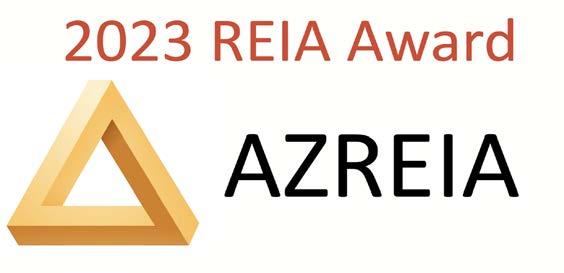


READY TO TAKE YOUR REAL ESTATE INVESTING CAREER TO THE NEXT LEVEL?





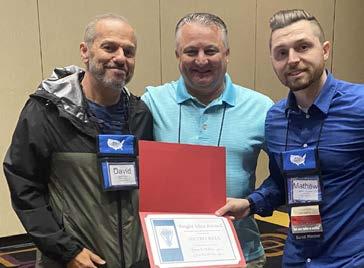
Unlock your full potential in real estate investing and discover the lucrative world of real estate note investing with Paperstac Academy.

Our comprehensive curriculum caters to beginners and covers everything from the fundamentals to advanced strategies for maximizing your returns, making it the ultimate note investing course.
Gain access to 50+ video lessons, contract templates, industry connections, note evaluation tools, and more! Our in-depth, practical approach empowers you with knowledge and tools to capitalize on the lucrative note investing market.

UNLOCK

Real Estate Journal · Fall 2023 9 Real Estate Journal
WAIT, JOIN THE PAPERSTAC ACADEMY TODAY!
DON'T
a taste of the exciting exciting world of note investing by of downloading our FREE our Note Investing Guides: Investing
STILL UNSURE? PROFITS WITH REAL ESTATE NOTE INVESTING. DOWNLOAD FREE GUIDES WITH THE QR CODE
YOUR POTENTIAL FOR UNBEATABLE Get
Guides:
https://marketing.paperstac.com/guides
2023 National REIA’s promote | protect | educate
Traction REIA (FL & DC)
Metro REIA (NJ) Metro East REIA (MO)
Arizona REIA (AZ)
property, negotiate the price, and then hunt for a lender.

Traditional lenders — including banks and hard money lenders — charge interest rates that can sometimes be exorbitant, especially in a volatile market. Moreover, there are approval processes, credit checks, and at times, hidden fees that can eat into the profit margins.
On the other hand, Nash’s Infinite Banking Concept advocates for individuals to leverage their whole-life insurance policies.
In essence, it’s about utilizing a properly structured policy, borrowing against its cash value, and then repaying it at one’s convenience. In this model, you’re both the borrower and the lender. You control the repayment schedule and, more importantly, you’re recapturing your principal amount time and time again. The key difference here lies in the control and flexibility it offers over traditional methods.
The numbers game
To illuminate this concept, let’s delve into a hypothetical scenario using $100,000 with both the bank and your own properly structured policy. To simply the example, we’ve annualized the amounts, so you can see what’s happening on a larger scale.
Borrowing from a Lender:
You borrow $100,000 from a traditional lender at an interest rate of 4%. By the end of the year, you owe $104,000 ($100,000 principal + $4,000 interest).
Costs & Growth: While you owe the bank $4,000 in interest, there’s no growth on your principal. The full cost of borrowing is $4,000.
Borrowing from Your Policy with Dividend-Driven Growth:
You have built up a cash value of $100,000 in your policy.
Growth Rate Including Dividends: The policy (principal) grows by a total of


5% that particular year due to dividends, increasing your available cash value by $5,000. By year’s end, without considering the loan, the gross cash value is $105,000.
Taking a Loan: You borrow the same $100,000 from your policy at a rate of 4%, owing $4,000 in interest at the year’s end.
Net Growth: Even after paying off the interest, you’re left with a net positive growth of $1,000.
Contrasting the two scenarios
Interest Cost: With the traditional bank, you’re out $4,000. With the policy loan, after considering the dividenddriven growth, you’re ahead by $1,000. That’s a clear difference of $5,000 between the two borrowing methods.
Asset Growth: In the bank scenario, there’s zero growth on your borrowed money. You borrowed the bank’s money, and are giving it back to them. In
contrast, your policy’s cash value grew, amplifying your assets, even as you utilized it for a loan. You will also be recapturing that principal balance to be used on something else, without having to apply for another loan and go through the rigorous process again and again.
Flexibility & Control: With the traditional bank loan, you’re bound by their repayment terms and conditions, which might include penalties for early repayment or other unforeseen charges. Borrowing against your policy offers more flexibility, allowing you to control the repayment terms and other dynamics.
Privacy & Credit: While traditional banks will go through a vetting process, including credit checks, borrowing from your policy remains a private transaction. More importantly, taking a loan against your policy doesn’t affect your credit score. This means your borrowing capacity remains undiminished in the eyes of the credit world, allowing you to maintain a strong financial position for other investments or necessities that require a favorable credit score.
Conclusion
When evaluating the two scenarios, it becomes evident that borrowing from your properly structured, dividendpaying whole-life insurance policy is not just about low ¬¬interest rates. It’s about holistic financial growth, maintaining control over your assets, and reaping the benefits of compounded growth. Even when the loan interest rates mirror each other, as in this example, the intrinsic growth and compounded benefits of a life insurance policy make it a more advantageous avenue for astute real estate investors.
For real estate investors, the goal has always been to maximize ROI while minimizing costs. Traditional financing avenues, with their rigid structures, have been the conventional route. But as the industry evolves, it’s prudent for investors to seek out novel, efficient strategies for financing. Nash’s Infinite Banking Concept, applied wisely, could be the gateway to enhanced financial freedom and success in the real estate domain.
Jason K Powers is a multi-business owner, real estate investor and an Authorized IBC Practitioner. In an exclusive partnership with the National Real Estate Investors Association, Jason is the go-to expert for all aspects of Infinite Banking and life insurance. Jason works with clients across the country, showing them how to achieve their financial goals by taking control of the banking function in their life and creating financial velocity that can last for generations.
Connect with Jason today to explore how the Infinite Banking Concept can empower you to reach your financial goals. www.1024wealth.com/NREIA
Real Estate Journal Real Estate Journal · Fall 2023 10
TEL: (877) 744-3660 WWW.NREIA.ARCANAINSURANCEHUB.COM UNIQUE COVERAGE, INTELLIGENTLY DESIGNED. Call us or visit our website for more information on our property and liability programs Investment Property Insurance Tenant Discrimination Program Landlord Supplemental Protection Tenant Renters Program Being Your Own Bank in Real Estate Investing ... continued from Page 1




Real Estate Journal · Fall 2023 11 Real Estate Journal cwsmarketing.com US Treasury Department REAL ESTATE AUCTIONS RESIDENTIAL, COMMERCIAL & LAND • Auctions open to the public • Clear title conveyed (unless speci ed) • No Buyer's Premiums charged! Sign up to receive detail noti cations on upcoming auctions at cwsmarketing.com Located Throughout the US & Puerto Rico
-
Please tell us a little about who you are and what you did before getting into real estate investing:
I’m just a truck driver’s daughter. I grew up living in a different rental, going to a different school every year as we followed my dad’s work. It was hard convincing my dad to let a girl waste time going to high school, so after graduation I took three jobs just to be able to cover college tuition and join my brothers. I finished a two-year course with ECPI University in one year, back when computers took up the whole basement of a bank. As a real estate secretary in the ’70s passing the test for Ohio and Michigan Realtor was easy, until I realized I had to feed my kids by commissions instead of a regular paycheck. Even though I was a full-time Realtor, I secretly supplemented my family income by managing a deli, running a cafeteria and a wedding catering business for two union halls and all the yacht club commodore balls.
At the time interest rates rose from 18% to 24%, jobs were disappearing and my clients’ homes weren’t selling. Refusing to give up on my seller’s needs and not being able to go to a bank as a female, I started taking over their mortgages and renting back to them until they were able to move on. I continued showing sellers that many mortgages are assumable, releasing them to buy again in the future and save their credit. I used a HELOC line of credit on my own home to buy rehab, and refinance rentals. Then I would pay back my HELOC.
I have been buying and holding for over 40 years without giving Uncle Sam capital gains since he wouldn’t give me any loans (Ha!). I often got stopped during the inspection asking if these houses were mine? That worked for about 10 years until they asked me if “I lived in all these houses”? Time for a new strategy, so I sidestepped union rules in a union town and went to the state capital and passed all the trades licenses. I just wanted to be left alone to work on my own houses. I ended up with 14 licenses and two construction offices that now do all the city, county and state lead abatement programs (plus 80 rentals as a hobby).
Where is your current market and what is your focus or area of expertise?
My market area is Toledo and its suburbs, plus areas of lower Michigan. I have been buying and holding properties for 40+ years. I give land contracts to good tenants and rent to nurses who turn my ranches into assisted living for patients. While president of Ohio REIA, I was able to work all around the state with REIAs of all shapes and sizes, and investing ideas. Then as National REIA President I was able to help take REIAs to the full chapter level to help all their investors! I was also a National Ambassador and able to help put
investors together to form their own REIAs all over the country, especially out west.
How did you get started?

It was during a terrible economy and I was looking for solutions to clients’ housing problems — plus a winwin for both sides of a deal. I never accepted NO, and always listened to the other person’s story. I was saving families by taking over their mortgages and homes to free them to move on. The only encouragement I had was my dad asking me when I was going to get a real job and then my mom — every time I took over another house — worrying because my rehabs/tenants were so messy! I did it alone in a vacuum for a decade. I never knew the term “investor” until I accidentally went to an investor meeting thinking it was for Realtors. My first question to all these amazing investors was “how can they have hundreds of houses when my life was full with only three?” The answer was too simple, the block was in my mind, the answer was the power of networking in a REIA. They answered; there’s a point of critical mass where all the houses start taking care of each other, financially, work-wise, tenant-wise. I had let my mind block stop me too soon and all I had to do was
listen to other investors and keep going!
Describe a typical work week for you as a real estate investor:
Probably — insane! I average 18 hours a day, seven days a week. I try to be in by midnight so I can have all the paperwork done by 2 a.m. for the next day. I literally do something different every day from an endless list that changes every time my phone rings. I am the 24hour phone for Toledo REIA, all investors, and my buyer/seller clients, local charities, OH/MI city, county, and state contractor programs. When I’m frustrated with meeting government officials, city inspectors, my buyers’ loan officers, appraisers, etc., I will take my stress out by installing roofs, windows, siding, furnaces, or just pounding an air-nailer and knocking down walls.
I am also a volunteer teacher at a high school Horizon class, Realtors continuing education, bank finance classes, state and national conferences and REIAs. Then, there’s the travel: two Ohio state conferences, three National REIA events and cruises, Toledo REIA’s international session, and the local college’s
Continued on Page 13

Real Estate Journal Real Estate Journal · Fall 2023 12
Member Spotlight
Anna Mills ... continued from Page 1
Working on a Habitat for Humanity project
Doing the bus tour in Milwaukee during NREIA Midyear 2022
international business professor’s sabbaticals. In my free time I have been able to speak all over the world. An international business professor invited me as a female contractor and REIA president to speak in Australia, New Zealand, Isle of Cypress, Egypt, Israel, six Greek Islands, Brazil, etc.
Of course, when the day is all scheduled, it often gets interrupted by a city council wasting your time sneaking in yet another crazy law that makes NO sense.
How long have you been investing in real estate?
Since 1970, but full-force since the late ’70s once I learned I could actually help people solve their problems.
Tell us about your first deal:
I took my cue from buying my own first house, when my offer was refused because the down payment of $1,500 was too much and would throw the sellers off their Medicare! On my first investment property, my 90-year old seller had just bought his first VA home but his wife passed away and he refused to any longer enter the house. There were no buyers available because interest rates were at 18%-24%. The seller left the deed on the counter, so I started investigating what his options were. I uncovered that VA home loans were assumable, and the paperwork was a $45 postcard that didn’t even ask for your phone number. Still, no buyers, but I couldn’t leave the seller in limbo any longer, so I assumed the VA loan until the economy changed. I still own that $12k home, 45 years later at $500 per month, leaving me ahead by $270k, with a very thankful seller.
How do you fund your investments?
There was no way in the ’60s and ’70s a young female (a commissioned Realtor) could go to a bank, so, it’s a good thing land contracts were available for my first family home. My first and second investment houses were “assumables,” because that was the solution for the sellers. The third house was an auction, so I used an equity line on my personal residence until I rehabbed and refinanced it with its rental income. I never needed or looked at banks again except when teaching bank finance classes to investors that they didn’t need banks. Then came REIA, the answer to every investor’s wants and needs! Every investor in the room is a buyer, seller, lender, rehabber at one time or another, and it changes every meeting!

Do you have a real estate license?
Yes. Besides a real estate license, I have at least 15 licenses and a half dozen certifications — all connected to real estate in one form or another. Every time life (or the government) tried to stop me, I found a way to get licensed and continue with investing.
How much time do you put into your real estate education?
Those 15 state licenses and six certifications all require as much as 30 hours of continuing education and sometimes testing. As far as investing topics, every Toledo REIA meeting, speaker and workshop bring education and Professional Housing Provider (PHP) certification. But just interacting with all the investors
at the REIA meeting brings the most amazing education with a twist and I will be doing the same tomorrow. I also co-authored a “Landlord Tenant Handbook,” and I teach investor workshops for the local housing authority, nationwide REIAs, and area banks. Has coaching or mentoring played a part in your success?
I have always worried about crazy mentors or crazier mentees, so we’ve always kept our mentor programs in-house (except Tony Youngs). In addition, I teach an investor 101 series called “Cool Contracts Clauses and Addendums,” “You Don’t Know What You Don’t Know,” “Successful Trade Fairs on a Shoestring,” “Yes
You Can — Thinking Outside the Box” for Horizon High School teenagers, “Tenant Backup Safety Net” for Catholic Charities workshops.

What are your current and future goals?
I am IN the future and I am DOING IT!

What has been your top struggle in this business?
Adding business over the past decades but forgetting to downsize any of them. Currently I still have two real estate and two construction offices, two nonprofits, am active with Toledo REIA and National REIA, 80 rentals as a hobby, traveling for REIA every other month … plus various government committees and charities.
What do you like most about what you do?
Absolutely everything! The challenges, the sharing, the volunteering, the people. But most of all, Toledo REIA meetings are the most positive space in my month. With the world being so negative, our REIA members are the most positive. I need that positive injection every month and it has kept me coming back since 1989.
Do you have a tip or advice that you would pass along to other investors?
What all the “gurus” tell you, after your money is gone! JOIN YOUR LOCAL REIAs, and spend your money on properties instead.
How important is joining a local REIA to a new investor?
It’s real-life reality! This is where you learn and meet everyone you ever need to know. Here you will find all the education, advantages, network and business partners that will help make you a successful investor. It’s like learning the tips and tricks directly from the pros — the people who have been there and done that.
What is your favorite self-help or business book?
There are so many, but, being an author myself, I would suggest finding a local investor/author. There are so many different facets to real estate investing. I would be proud to recommend any of the great speakers we have vetted and brought into Toledo REIA meetings.

Do you have any interesting hobbies or something unique that you like to do?
Well, doing roofs, windows and furnaces are pretty normal “hobbies” for me. However, I like to decorate wedding and children’s cakes that are molded into all different shapes.
Real Estate Journal · Fall 2023 13 Real Estate Journal
Member
Mills ... continued from Page 12
Spotlight - Anna
Working with Pete “Mr. Rehab” Youngs and partner Phil
Real estate fun, facts & stats class at a Manhattan pub
Fire-fighting skill training with the fire marshal
Who’s Afraid of Fraud? We All Should Be
By David Pickron
Ihave a neighbor who, over a year ago, received a call from the FBI, seeking her assistance in targeting a group of individuals who were performing illegal wire transfers. Over the year she had assisted with other tasks and had become a trusted ally of the FBI.
Then recently, the FBI asked her to increase her involvement after having gained the trust of the illegally operating group. They told her they had set a trap to finally catch these guys and that they would keep her updated on their every move. They thanked her for her willingness to do her part to catch the bad guys. Then the call came in with her FBI contacts directing her to transfer $700,000 to this group, where they could then track the money to see where it went and then make an arrest after 18 months of work. The FBI guaranteed the return of the money once the transfer was completed and they were able to make the bust.
She agreed, transferred the $700k, and waited… and waited. After a few days she began to wonder when the money would be returned. Not understanding how long the arrest might take, she was patient. After a couple of weeks went by, she decided to call the FBI and ask about her money…. as you already guessed, they had no idea what she was talking about or even who she was.
These stories of fraud are becoming all too common. The minute details and the elaborate amount of work these fraudsters are going through to trick you are amazing. We used to worry about our mail being stolen, then our email being hacked, but we are entering all unfamiliar territory. Your need to stay vigilant is more important than ever; consider these six vital tools in your fight to protect what is yours.
1. Freeze your credit.
You can freeze your credit at this link: https://www. experian.com/freeze/center.html
With your file frozen, others will not be able to access credit in your name. When you need to access your credit for real, simply log in to Experian and put a “Thaw” on your file. This is completely free, and you can do it as often as you like. As a private investigator, I am often asked how to protect yourself from identity theft or people opening fraudulent accounts in your name. This is my first go-to.
2. Treat your bank account number like your Social Security number.
For years we passed out a piece of paper called a check which contained routing numbers and account numbers. With ACH transfers and wire transactions, your bank account information has become the new gold standard for criminals.
3. Use a credit card for most transactions.
There are protections that credit cards offer. If something is fraudulent, you can dispute, and the company involved with that transaction is usually found at fault for letting a fraudulent transaction go through their system.
4. Expect your bank to be more diligent when it comes to wire fraud.
What used to be an email request for me now requires in-person, ID scanning, code-giving experience. A little frustrating, but these financial institutions are only trying to protect you.
5. Be specifically cautious when buying a home and going through a title company.
There are countless stories about fraudulent wiring, where the down payment you thought was going to the title company actually went to the Congo. Check the URL and make a phone call to the title company to clarify the wire. Don’t hesitate to go back to a certified cashier’s check right from your bank.
6. Verify the URL on all emails that require you to change your password to your financial institution or any website.



Fraudsters know we use the same passwords on many online sites. Getting your email account and password
you use at Starbucks could unlock your account at Bank of America. I always suggest having sole and separate passwords on all websites. It is hard to remember, so if that’s too much, at least change the financial institution credentials to be unique.
I could not possibly cover all the ways you can get scammed today. With AI and Chat GPT, the spelling is getting better on the emails and the graphics are looking more legit. I can promise you with all the data breaches, your identity is most likely out on the dark web, so treat your transactions as if everyone is fraudulent at first. This country was founded on “innocent until proven guilty,” but your transactions should be considered fraudulent until proven legitimate.
David Pickron is president of Rent Perfect, a private investigator, and fellow landlord who manages several short- and long-term rentals. Subscribe to his weekly Rent Perfect Podcast (available on YouTube, Spotify, and Apple Podcasts) to stay up-to-date on the latest industry news and for expert tips on how to manage your properties.
Members of National REIA can take advantage of special pricing from RentPerfect; the solution for rental property owners and managers for screening & managing tenants. Learn more by visiting www.rentperfect.com or calling 1-877-922-2547.
Common Questions About Assistance Animals ... continued from Page 1
Here is an examination of three common questions that leasing teams and property managers have about assistance animals. Future articles will outline other frequently asked questions.
1. Is an emotional support animal allowed to go into the pool area?
The short answer is “yes.” Assistance animals – whether they are service or support – can go anywhere your residents can go. This includes commonarea spaces and the leasing office.
So “yes” to the pool deck — but not in the water, of course. And “yes” to the business center, the fitness center, the coworking space, the outdoor grilling area, the theater room, etc.
2. How should you weigh the fears, phobias and allergies of other residents against a renter’s need for an assistance animal?
In certain situations, an operator could end up between two people who are disabled. On the one hand, you have the renter with an assistance animal. On the other, you have a resident whose disability could be negatively impacted by the presence of the assistance animal. In these situations, operators are going to have to navigate and negotiate as best as they can. Try asking your residents for their preferred outcomes, and don’t hesitate to seek out the legal expertise you may need, whether that’s in the form of in-house counsel or outside assistance.
More often, though, when a resident protests a particular assistance animal, it’s because of their discomfort, distaste or dislike of the animal. And those sentiments cannot be given the same weight as someone’s disability.
3. Can a person have an unlimited number of emotional support animals?
In theory, at least, there is not a limit to how many emotional support animals a resident may have. However, operators are unlikely to find themselves in a situation where a resident’s unit is housing half a dozen such animals.
That’s because each animal has to offer a unique benefit and unique ability to ameliorate one or more of the symptoms associated with the disability of the
person making the accommodation request. At a certain point, it becomes hard to substantiate, for instance, five different benefits from five different emotional support cats. Additionally, operators always have the right in the assistance animal accommodation request process to consider if the request is “reasonable” or not.
Victoria Cowart, CPM, NAAEI Faculty, is the Director of Education & Outreach for PetScreening. For more information, please visit PetScreening.com.
Real Estate Journal Real Estate Journal · Fall 2023 14
A System and Discipline
By Tony Youngs
Iremember when I attended my first seminar back in the ’80s, the speaker said you have to have a system and discipline. I knew what the system was because he was teaching it. But I did not know what the discipline was until I began to apply the system. The discipline is that you have to take the action to make the system work properly.
Through months and years of trial and error, I now know what he meant by discipline. I had to discipline myself to always take action, even when I didn’t feel like it. Despite all the easier, softer ways of doing things today, I still sometimes don’t feel like it. But I force myself to take action.
Many years ago, I found something on the internet that I printed and framed and it is on my office wall. It’s called, the “7 Excuses:
1. I can’t do it.
2. I’m not feeling it right now.
3. I’m too busy.
4. I’m too tired.
5. There’s no guarantee it’s going to work.
6. I’m not good enough.
7. My luck sucks.
To this day, I still do not know who the author is, but I read that from time to time to keep me motivated. I always check to see if I’m making excuses. Let’s break it down.
1. I can’t do it.
If that’s what I’m thinking, I’m probably right, But, if I change it, I can do it, I’m also right. I must program my mind that I can do it. Then, all I need to do is try, and if I run into a hurdle, I find a way around it
and with some fine tuning, I find that I can do it, So, really, all I have to do is get started. Any challenge we run across that we feel we can’t do, all we have to do is get on YouTube or the internet. With all the resources available today, you can do just about anything.
2. I’m not feeling it right now.
All I have to do is get started. I discipline myself to plot a course of about eight foreclosure properties each week to go visit. Sometimes I just don’t feel like going, but I tell myself to just go see the first one. Then the motivation kicks in and I start to get excited. So I go to the second, then third. It is just a matter of getting started.
3. I’m too busy.
Everybody is busy. I have found that if I add it to my list of things to do, somehow it gets done and there is time to do it. I have a gym membership that I sometimes feel I’m too busy to use. But I take the action to go and do the first exercise, then the energy kicks in. Energy breeds more energy.
4. I’m too tired.
Who isn’t? We all get tired. It’s just a matter of going to bed a little earlier so you can get a good night’s sleep. Take inventory of your TV habits and see what you can do to get enough rest.
5. There’s no guarantee it’s going to work. So what? There is a guarantee it won’t work if you don’t try. I have found that persistence pays off. Real estate is a numbers game. It’s being at the right place at the right time and if I keep on keeping on, I get the

good ones, even though there’s no guarantee.
6.
I’m
not good enough.
Start telling yourself you are good enough. Educate yourself more, hang out with positive people, read success books, Join a REIA and attend every meeting. Surround yourself with successful entrepreneurs. It will rub off on you.
7. My luck sucks.
I heard a wise man make the statement: “You create your own luck. Luck is when action meets opportunity.” That fits right into my real estate business. I take action each week to drive through neighborhoods, and I find opportunities every time I go, and that in turn creates good luck. I always find great deals.
We all know that real estate requires work and action. It’s not always easy, but if you have a system and the discipline to follow that system, you can’t help but succeed.
Tony Youngs is a trainer, national speaker, active real estate investor and the author of the “Hidden Market” system of acquiring off-market properties. He can be reached at his website at www.tonyyoungs.com.

Real Estate Journal · Fall 2023 15 Real Estate Journal You Can Make More Money Using Land Trusts Download a Complete Guide & Forms for Creating Your Real Estate Land Trusts • Make bigger profits when selling on an installment contract • Eliminate the risk of selling on a note or contract • Make more money when selling on a lease option • Eliminate confrontations with tenants • Combine this one essential step with LLCs for dy-no-mite asset protection • Avoid due-on-sale, transfer taxes, reassessment upon sale and seasoning issues • Obtain privacy of ownership and avoid frivolous lawsuits • • • • • • • Receive Your FREE COPY of “Reasons to Use a Land Trust” at: LandTrustsMadeSimple.com/NREIA Mr. Land Trust® Randy Hughes More than 50 years experience For more information, contact Randy at: 217.355.1281 Randy@MrLandTrust.net LandTrustsMadeSimple.com/NREIA
Things You Need to Know about Trusts

 By Jeffery S. Watson
By Jeffery S. Watson
With the growing interest in creative financing, real estate investors are becoming more enamored with “land trusts,” a term of which I’m not really a fan. I prefer the more precise term “Grantor Revocable Title Holding Trust.” What exactly is a trust, why does it work, and what are some of the biggest misconceptions regarding trusts?
At its core, a trust is a legal agreement in which one party — the trustee — owns and holds title to a piece of real estate for the benefit of one or more other parties — the beneficiaries. By creating a trust in this manner, some of the rights related to property are severed or split. The burdens and responsibilities are put on the shoulders of the trustee, and the benefits of enjoyment and use are in the hands of the beneficiary.
Looking back, you will find that trusts were used hundreds of years ago in England during the era of the crusades. Despite their recent resurgence in popularity, trusts remain confusing to many real estate investors, which leads to their ineffective and inappropriate use. When a trust is used correctly, it can be a powerful tool for privacy, property management, and tax-planning advantages. Used incorrectly, a trust can cause more harm than good.
An important point to understand is that a Grantor Revocable Title Holding Trust (“GRTHT”) provides little to no asset protection. Rather, if properly used, it provides significant privacy. I’ve seen people make mistakes, however, when putting properties into trusts, and they give up their privacy.


When a frugal real estate investor transfers a property out of their name or entity into a GRTHT, they use a Deed to Trustee; but when they record the deed, they have it done as an exempt conveyance, which is the equivalent of saying they moved the asset from their right pocket to their left pocket. Anyone who knows how to read land transfer records can figure out that the property simply moved from the investor’s right pocket
to their left pocket, and that the investor still owns the property. It doesn’t matter that it’s in a trust, and it doesn’t matter that the trustee is some entity for which we can’t figure out the owner. That person may have saved on transfer taxes, but they have given up their privacy to anyone with basic knowledge to look closely.
If, however, the Warranty Deed to Trustee coming from their entity is recorded as a taxable, arm’s-length conveyance, and they willingly pay the transfer tax (ouch!), they have now created the impression that it is an arm’s-length conveyance which they sold from their right pocket without it landing in their left pocket. Remember, trusts in and of themselves are not fantastic for asset protection. They are great smokescreens provided you don’t blow your cover by doing something foolish, and privacy is a layer of asset protection.


One thing you could do is set the transfer price at approximately 87% of the current market value as shown on the tax rolls. Does this hurt the comps in the neighborhood? Yes, but does it help you with potential real estate tax increases? Yes. Remember, you, as the owner of the property, have a better understanding of the value of that property than anyone else because you know everything that needs to be fixed or improved to continue to make it a good, cash-flow-producing rental property. Verify this strategy with your local attorney. Here is something to consider when selecting a trustee that will help with privacy. I was speaking with an out-of-state investor who was doing a deal in Cleveland, Ohio. I reminded him that if he was going to be putting any of the properties into trusts, he needed to make sure his trustee was an Ohio-based trustee. In Ohio — especially in Cuyahoga County where Cleveland is located — they will look for out-of-state property owners who have not registered their entity with the Ohio Secretary of State. That headache can be avoided by using an in-state trustee because it will not show up on public record as an out-of-state owner. Rather, it shows up as a trust domiciled in Ohio because the trustee is in Ohio.

The legal landscape regarding the usage of trusts is governed by general principles of real property law and contract law, but some states also have specific statutes, such as Florida and Illinois for example, regarding the function and operation of trusts. It’s important, therefore, to know in advance what your state’s laws are regarding trusts.
When creating a trust, think about who the beneficiary of the trust will be. I often recommend that it be a limited liability company so that if someone gets through the smokescreen of the identity shield of the trust, the brick and steel walls they run into are a corporate trustee and a limited liability company as a beneficiary. That makes it harder for creditors and predators to get to the assets.
Here are a couple of final thoughts regarding GRTHTs. When creating a trust, make sure you name a successor trustee in addition to the original trustee, and always name at least one contingent beneficiary. Also, remember that a trust needs to be signed, witnessed and notarized with the same formality and legality that you would use with a deed or mortgage because the trust owns the real estate.
Jeffery S. Watson is an attorney who has had an active trial and hearing practice for more than 25 years. As a contingent fee trial lawyer, he has a unique perspective on investing and wealth protection. He has tried over 20 civil jury trials and has handled thousands of contested hearings. Jeff has changed the law in Ohio four times via litigation. Read more of his viewpoints at WatsonInvested.com.
Real Estate Journal Real Estate Journal · Fall 2023 16
PROPERTY
MANAGEMENT MADE EASY
Spend less time managing your properties with powerful, userfriendly software.
Over 150,000+ Happy Customers

Intuitive Design
Popular features include tracking income and expenses, tenant and lease management, online payments, tenant screening, e-sign, portals, maintenance and more.

Amazing Benefits
Automation and sophisticated reporting saves you countless hours. Schedule E & 1099s are automatically generated for taxes and your rental business is organized in one safe and secure system.
Incredible Support
With free training and live phone, email and text support, SimplifyEm will help take your business to the next level.

About SimplifyEm
their
SimplifyEm has been helping landlords and property managers streamline and grow their business for over 17 years.

Real Estate Journal · Fall 2023 17 Real Estate Journal
"Very user friendly as well as
staff members. The best part of SimplifyEm is the affordability of the software."
Scan for a Free Demo
Nick
Mustamarhadi, Washington Harbour Homes LLC
5 Star Reviews
Self-Directed IRAs and 1031 Exchanges: Powerful Tools in a Real Estate Investor’s Arsenal
 By David Gorenberg, JD, CES
By David Gorenberg, JD, CES
We have been receiving a lot of calls recently regarding the use of self-directed IRAs and 1031 exchanges. While many investors use one strategy or the other, savvy investors recognize that each has unique benefits, and they can be used in tandem as part of a creative investment strategy.
What is an IRA?
IRA stands for Individual Retirement Arrangement. Investors contribute to their individual retirement accounts. The Internal Revenue Service tells us that a traditional IRA is a tax-advantaged personal savings plan where contributions may be tax deductible. They use the word “may” because there are annual contribution limits based on age and income, and whether the investor is covered by a retirement plan at work. For 2023, the annual contribution limit is $6,500, or $7,500 if the investor is age 50 or older.
Contributions made to an IRA within the IRS limits are tax-deductible, and any interest or growth on those investments is tax-deferred. When the investor starts making withdrawals, those withdrawals are taxed as ordinary income at that time.
IRAs are held by a custodian, such as banks, brokerages, or other financial institutions, many of which have recognizable names. Except for certain collectibles, there are very few limits on the kinds of assets an investor may hold in their IRA. (See IRS Publication 590a for more information on IRAs.)

However, the brokerages and financial institutions whose names we see most often tend to limit investments to stocks, bonds, and mutual funds.
What is a self-directed IRA?
A Self-Directed IRA (“SDIRA”) is an IRA held by a custodian that allows for investment in a broader range of assets than other IRA custodians. These “alternative assets” may include real estate, precious metals and other commodities, tax lien certificates, and others. Additionally, while the custodian administers the account, it is directly managed by the investor, which is why it is called self-directed.
Among the more common investments in SDIRAs is investment in real estate. These investments can be
in the form of single-family, multi-family, commercial, industrial, office, improved or unimproved land, or virtually any other interest in real estate. Foreign real estate is also permitted.
When owning real estate inside of an SDIRA, all income from the real estate belongs to the SDIRA, not to the investor. Thus, the investor cannot use any rental income from the real estate to cover personal living expenses. Additionally, when selling real estate that is owned by the SDIRA, all profits or losses belong to the SDIRA and continue to grow tax-deferred. If the investor chooses to reinvest in more real estate, there are now timing restrictions, and proceeds may be held in the SDIRA until they are deployed toward the acquisition of a new asset. However, there are prohibitions on “selfdealing” that are essentially the same as the related party rules in a Section 1031 exchange. This rule also prohibits investors from making any personal use of the SDIRA asset, though it can be rented to family members at fair market rental rates.
Section 1031 exchanges compared to SDIRAs
Section 1031 of the Internal Revenue Code Internal Revenue Code allows an owner of business or investment real estate to sell old property (relinquished property) and acquire new property (replacement property) without paying any taxes on the profit (capital gains) of the sale of the old property. The principle underlying these “tax-deferred exchanges” is that by using the exchange value from one property to buy another — instead of receiving cash for that exchange value — the property owner is simply continuing the investment in the original property. As such, the IRS will not recognize the sale as a taxable event, provided that the owner (referred to in this article as the “taxpayer” or “exchanger”) adheres to the many rules governing exchanges.
As with the SDIRA, real estate can be any asset class — single-family, multi-family, commercial, industrial, raw land, etc. Section 1031 rules require that both the relinquished and replacement properties be “held for productive use in a trade or business or for investment. This is similar to the prohibition on self-dealing discussed above. Moreover, Section 1031 provides for a deferral of the capital gains and depreciation recapture
taxes, much like the SDIRA. But the similarities largely fade after this point.
First, there are no limits to the amount of money that can be invested using Section 1031. Further, while rental income from SDIRA property must stay within the SDIRA, the income from Section 1031 exchange property can be used by the taxpayer to pay their own personal expenses. Additionally, upon the sale of the relinquished property, the proceeds must be held by a qualified intermediary, and the taxpayer must avoid even “constructive receipt” of the exchange funds. Finally, there are strict time limits imposed on Section 1031 exchange transactions.
Starting with the date of sale of the relinquished property, the taxpayer must identify a short list of potential replacement properties within 45 days and complete the acquisition of one or more of those properties within 180 days (or the due date of the taxpayer’s tax return for the year that the exchange commenced).
And while foreign real estate may be part of the taxpayer’s portfolio, foreign real estate is not like-kind to domestic real estate, and they cannot be part of the same 1031 exchange transaction.
Consult
with a Knowledgeable QI, Financial Planner, Attorney, and CPA
As can be seen, each option — owning real estate in an SDIRA, or outside of the SDIRA, — has merits and pitfalls. Each can be part of a successful real estate investment strategy, independently, or together. This article is not intended to be an exhaustive dissertation on the uses of these two investment strategies, but rather a conversation-starter. Investors are encouraged to discuss their unique situations with their financial planner, attorney, and accountant.
David Gorenberg is a third-generation real estate investor, an attorney and Certified Exchange Specialist®, and serves as Director of Education for Accruit. Members of National REIA can take advantage of special pricing from Accruit. Learn more by contacting David directly at 215.770.6354, or by visiting www.accruit.com.
Real Estate Journal Real Estate Journal · Fall 2023 18










Real Estate Journal · Fall 2023 19 Real Estate Journal
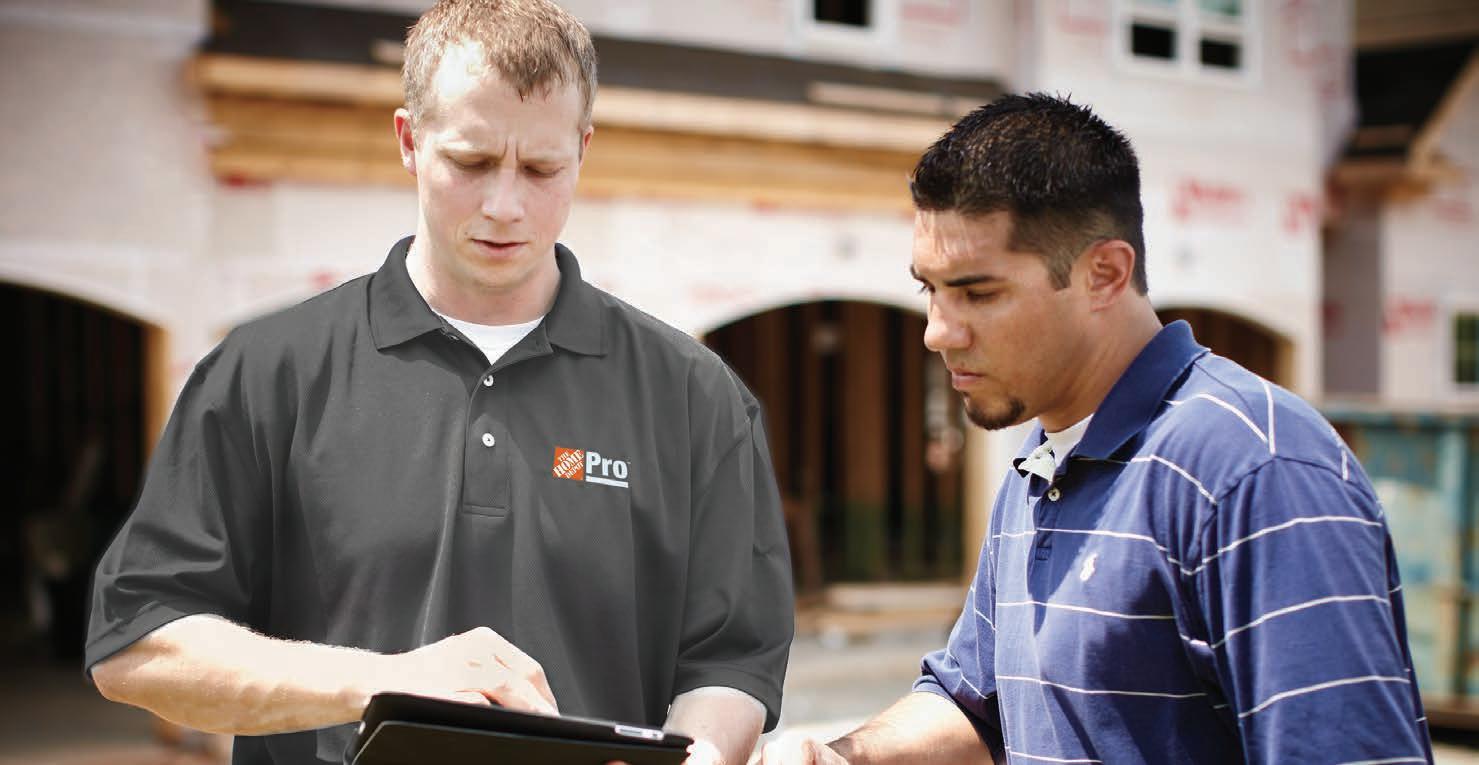
Real Estate Journal Real Estate Journal · Fall 2023 20 The Home Depot has the tools to help you get more done faster. With convenient shopping, delivery how you need it, dedicated Pro support and a cash-back rebate program*, we help you reach your business goals. Plus, NREIA members receive Gold Tier Paint Rewards with 20% off paints, stains and primers every day. Reach out to NREIA or your local chapter to learn how you can start earning cash back today. *Participating members with semiannual net purchases of more than $5,000 receive a 2% rebate from The Home Depot based on spend on registered forms of payment in Pro Xtra and tied to the NREIA program. Rebate periods are January 1- June 30 and July 1 - December 31. Rebate checks are issued 60 days after the rebate period ends. Restrictions apply. Please call 1-866-333-3551 or homedepot.nationalreia.org for further details. Pro Xtra Paint Rewards is a sub-program of the Pro Xtra Program. Pro Xtra Paint Rewards Qualifying Purchases will be tracked during the Program Period and include select The Home Depot Paint department in-store purchases and online purchases from The Home Depot websites, see https://www.homedepot.com/c/ProXtra_TermsandConditions for details. Learn more at homedepot.com/c/Pro_Xtra. NREIA MEMBERS EARN 2% CASH BACK* ON EVERY PURCHASE HOW DOERS GET MORE DONE








 By Rebecca McLean, Executive Director, National REIA
By Rebecca McLean, Executive Director, National REIA























































































 By Jeffery S. Watson
By Jeffery S. Watson













